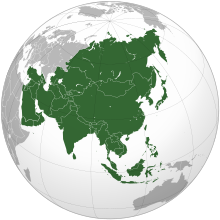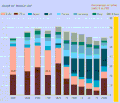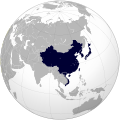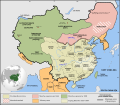Our website is made possible by displaying online advertisements to our visitors.
Please consider supporting us by disabling your ad blocker.
Portal:Asia

 Asia (/ˈeɪʒə/ ⓘ AY-zhə, UK also /ˈeɪʃə/ AY-shə) is the largest continent in the world by both land area and population. It covers an area of more than 44 million square kilometres, about 30% of Earth's total land area and 8% of Earth's total surface area. The continent, which has long been home to the majority of the human population, was the site of many of the first civilisations. Its 4.7 billion people constitute roughly 60% of the world's population. Asia shares the landmass of Eurasia with Europe, and of Afro-Eurasia with both Europe and Africa. In general terms, it is bounded on the east by the Pacific Ocean, on the south by the Indian Ocean, and on the north by the Arctic Ocean. The border of Asia with Europe is a historical and cultural construct, as there is no clear physical and geographical separation between them. A commonly accepted division places Asia to the east of the Suez Canal separating it from Africa; and to the east of the Turkish straits, the Ural Mountains and Ural River, and to the south of the Caucasus Mountains and the Caspian and Black seas, separating it from Europe. Since the concept of Asia derives from the term for the eastern region from a European perspective, Asia is the remaining vast area of Eurasia minus Europe. Therefore, Asia is a region where various independent cultures coexist rather than sharing a single culture, and the boundary between Europe is somewhat arbitrary and has moved since its first conception in classical antiquity. The division of Eurasia into two continents reflects East–West cultural differences, some of which vary on a spectrum. (Full article...) Featured article K-pop (/keɪ pɒp/, Korean: 케이팝; RR: Keipap), short for Korean popular music, is a form of popular music originating in South Korea. It includes styles and genres from around the world, such as pop, hip hop, R&B, rock, jazz, gospel, reggae, electronic dance, folk, country, disco, and classical on top of its traditional Korean music roots. The term "K-pop" became popular in the 2000s, especially in the international context. The Korean term for domestic pop music is gayo (가요; 歌謠), which is still widely used within South Korea. While "K-pop" can refer to all popular music or pop music from South Korea, the term is often used when referring to artists associated with the entertainment and idol industry in the country, regardless of the genre of music output. Modern K-pop "idol" culture began in the 1990s, as K-pop idol music grew into a subculture of South Korean culture and amassed enormous fandoms of teenagers and young adults. The more modern form of the genre, originally termed "rap dance", emerged with the formation of the hip hop boy band Seo Taiji and Boys, in 1992. Their experimentation with different styles and genres of music and integration of foreign musical elements helped reshape and modernize South Korea's contemporary music scene. After a slump in early idol music, TVXQ and BoA from 2003 marked a new generation of K-pop idols that helped the music genre gain traction in the neighboring Japanese market and continues to popularize K-pop internationally today. With the advent of online social networking services and South Korean TV shows, the current spread of K-pop and South Korean entertainment, known as the Korean Wave, is seen not only in East Asia, but also throughout the world, gaining an international audience. (Full article...) Selected Country Yemen, officially the Republic of Yemen, is a country in West Asia. Located in southern Arabia, it borders Saudi Arabia to the north, Oman to the northeast, the Red Sea to the west, the Gulf of Aden to the south, and the southeasten part of the Arabian sea to the east, sharing maritime borders with Eritrea, Djibouti and Somalia across the Horn of Africa. Covering roughly 455,000 square kilometres (176,000 square miles), with a coastline of approximately 2,000 kilometres (1,200 miles), Yemen is the second largest country on the Arabian Peninsula. Sanaa is its constitutional capital and largest city. Yemen's estimated population is 34.7 million, mostly Arab Muslims. It is a member of the Arab League, the United Nations, the Non-Aligned Movement and the Organisation of Islamic Cooperation. Owing to its geographic location, Yemen has been at the crossroads of many civilisations for over 7,000 years. In 1200 BCE, the Sabaeans formed a thriving commercial kingdom that included parts of modern Ethiopia and Eritrea. In 275 CE, it was succeeded by the Himyarite Kingdom, which spanned much of Yemen's present-day territory and was heavily influenced by Judaism. Christianity arrived in the fourth century, followed by the rapid spread of Islam in the seventh century. Yemenite troops played a crucial role in early Islamic conquests. Various dynasties emerged between the 9th and 16th centuries. During the 19th century, the country was divided between the Ottoman and British empires. After World War I, the Kingdom of Yemen was established, which in 1962 became the Yemen Arab Republic (North Yemen) following a coup. In 1967, the British Aden Protectorate became the independent People's Democratic Republic of Yemen (South Yemen), the first and only officially socialist state in the Arab world. In 1990, the two Yemeni states united to form the modern Republic of Yemen, with Ali Abdullah Saleh serving as the first president until his resignation in 2012 in the wake of the Arab Spring. (Full article...) Featured biographyNarendra Damodardas Modi (born 17 September 1950) is an Indian politician who has served as the prime minister of India since 2014. Modi was the chief minister of Gujarat from 2001 to 2014 and is the member of parliament (MP) for Varanasi. He is a member of the Bharatiya Janata Party (BJP) and of the Rashtriya Swayamsevak Sangh (RSS), a right-wing Hindu nationalist paramilitary volunteer organisation. He is the longest-serving prime minister outside the Indian National Congress. Modi was born and raised in Vadnagar in northeastern Gujarat, where he completed his secondary education. He was introduced to the RSS at the age of eight. At the age of 18, he was married to Jashodaben Modi, whom he abandoned soon after, only publicly acknowledging her four decades later when legally required to do so. Modi became a full-time worker for the RSS in Gujarat in 1971. The RSS assigned him to the BJP in 1985 and he rose through the party hierarchy, becoming general secretary in 1998. In 2001, Modi was appointed chief minister of Gujarat and elected to the legislative assembly soon after. His administration is considered complicit in the 2002 Gujarat riots, and has been criticised for its management of the crisis. According to official records, a little over 1,000 people were killed, three-quarters of whom were Muslim; independent sources estimated 2,000 deaths, mostly Muslim. A Special Investigation Team appointed by the Supreme Court of India in 2012 found no evidence to initiate prosecution proceedings against him. While his policies as chief minister were credited for encouraging economic growth, his administration was criticised for failing to significantly improve health, poverty and education indices in the state. (Full article...) General imagesThe following are images from various Asia-related articles on Wikipedia. Featured picture Credit: Yann The Gondi people are people in central India, spread over the states of Madhya Pradesh, eastern Maharashtra (Vidarbha), Chhattisgarh, northern Andhra Pradesh, and Western Orissa. With over four million people, they are the largest tribe in Central India.
Did you know...
Updated: 21:05, 6 February 2025 In the news
Related portalsMajor Religions in Asia Middle East Central Asia and Caucasus Indian Subcontinent Southeast Asia East Asia Selected panorama
Baalbek is a town in the Beqaa Valley of Lebanon situated east of the Litani River. It is famous for its exquisitely detailed yet monumentally scaled temple ruins of the Roman period, when Baalbek, then known as Heliopolis, was one of the largest sanctuaries in the Empire. TopicsCategoriesAssociated WikimediaThe following Wikimedia Foundation sister projects provide more on this subject:
More portalsShortcuts to this page: Asia portal • P:ASIA |
Previous Page Next Page































































































